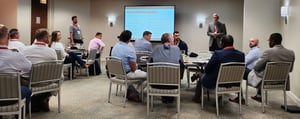ISO/TC 131 Fluid Power Systems
Our society, economy and industry need standards because they:
- Enable products to work interchangeably or together;
- Provide assurance that a product can deliver a certain level of performance;
- And provide the tools (for example, symbols and terminology) that make it easier for designers, manufacturers and users to communicate.
Since it was formed in 1953, the National Fluid Power Association (NFPA) has worked to foster cooperation among users and manufacturers by developing recommended standards and practices.
Standards benefit the fluid power industry as a whole. Standards benefit users because they:
- Simplify the use of fluid power
- Help educate users on how to correctly size and apply products
- Determine product performance and how it is measured, allowing comparison
- Communicate needs in a commonly understood language
- Are written with input from users
Standards benefit manufacturers because they:
- Provide uniform methods for testing products and advertising their ratings
- Help to assure system integrity and safety in the application of fluid power
- Help to improve efficiency of fluid power products and systems
- Simplify the variety of products and sizes in the marketplace
- Encourage new product development
- Help avoid confusion in communicating with customers
- Communication Standards define the basic terms, symbols and other communication tools used in the fluid power industry. Vocabularies, graphic symbols and dimension codes are typical subjects for communication standards.
- Design Standards establish dimensions, tolerances or other physical characteristics of products. They ensure that fluid power products meet dimensional criteria that enable interfacing and interchangeability.
- Performance Standards provide a voluntary method of rating products. Pressure rating, particle counting methods used in contamination analysis, and methods of testing for strength and volume are typical performance standards.
- You benefit personally and professionally from participating in standards development by interacting with your peers in the industry and by learning more about fluid power technology and the industry itself.
- Your company benefits from participating by being in a position to influence the content of standards as they are developed and/or by using its vote, as each company, large or small has the same influence at ballot time.
- Membership on U.S. TAG committees entitles members to vote and comment on standards under development, thereby influencing the standards' content. If you volunteer to serve as a U.S. TAG project sponsor or ISO project leader, you are a key person in developing a standard's content, overseeing the project from beginning to end.
- Learn how standards supports businesses, developed by the American National Standards Institute (ANSI).
The ISO committees meet individually in-person one or two times per year. The U.S. TAG's (Technical Advisory Group's) meet at-least once per year, either in person or virtually.
Much of U.S. TAG's work, for example ballots and documents to comment on, is done by correspondence.
Committee members may be nominated to serve as working group experts or sub-committee delegates at an international meeting, and are expected to pay their own travel expenses.
Responsibilities of members of the U.S. TAG are:
- respond to ballots;
- attend a meeting at least once per year;
- work with others to determine what is best for the U.S. in international fluid power standards work.
As the ISO/TC 131 fluid power secretariat and U.S. TAG administrator, NFPA ensures that U.S. TAG members have the most current information on international fluid power standards projects. The association sets up meetings, circulates agendas, minutes and pertinent documents, administers ballots and tallies the results to ensure that due process procedures are followed.

